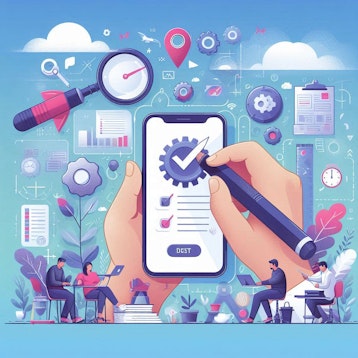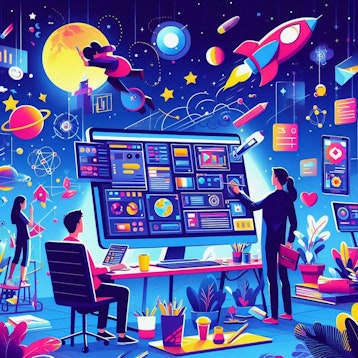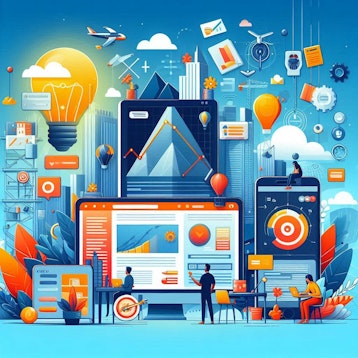As of 2024 and beyond, Artificial Intelligence (AI) has not only become a critical player in marketing but also a key differentiator for brands aiming to connect deeply with their audiences. AI integration into marketing tools has gone far beyond mere novelty to become an essential element of digital strategies due to its unparalleled capacity for data analysis, trend prediction, and personalizing interactions at scale.
Marketers now leverage AI to craft campaigns that are not only more efficient but also resonate deeply with their target audiences. A classic example is how AI UX Design Review offer startups and founders an insight into how AI and UX design work together to enhance user experiences which indirectly translates to concerted sales and marketing results.
AI technology plays a key role in modern marketing, particularly as consumers become overwhelmed with digital content. Traditional marketing tactics fall short here; AI tools bridge this gap by offering highly tailored messages tailored directly to individuals' preferences and behaviors- something human marketers could never accomplish at such a scale. Such customization increases user engagement, enhances customer satisfaction levels, and ultimately drives conversions.
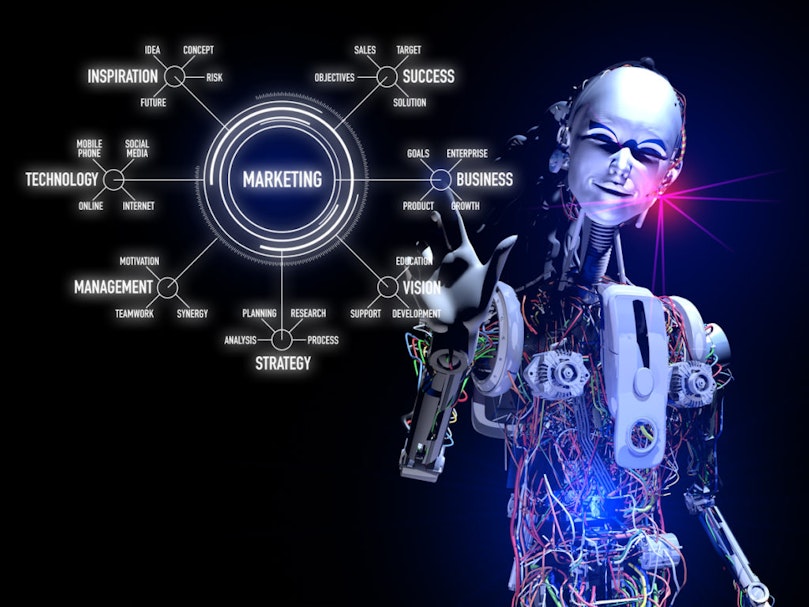
The Evolution of AI in Marketing
The evolution of AI in marketing has been a journey from rudimentary automation to sophisticated, predictive analytics that tailor experiences to individual consumer behaviors and preferences. This transformative path began with simple automated tasks, such as email auto-responders, which laid the groundwork for the integration of AI into marketing strategies. Over time, as AI technology advanced, its capabilities expanded beyond simple automation to sophisticated predictive analytics. For those interested in a deeper dive into AI tools' capabilities, Improvado provides detailed analysis and examples of how these tools are shaping the marketing landscape.
In the early stages, the focus was on efficiency—reducing the time and resources spent on repetitive tasks. However, the potential for AI to provide deeper insights into customer data quickly became apparent. Marketers began leveraging AI for more complex applications, such as predictive analytics, which allowed for the anticipation of customer needs and the delivery of tailored marketing messages before the customer explicitly expressed them.
The introduction of machine learning algorithms marked a significant advancement in AI marketing. These algorithms could learn from data patterns, enabling the creation of highly personalized customer experiences. The capacity to analyze vast datasets in real-time meant that AI could identify trends and make recommendations with a level of accuracy and speed unattainable by human analysis alone.
By 2024, AI in marketing has evolved to encompass a wide range of tools and technologies, including chatbots for customer service, AI-powered content creation tools for dynamic content generation, and sophisticated analytics platforms for deep consumer insights. This evolution has shifted marketing from a predominantly reactive discipline to a proactive, predictive strategy, where decisions are data-driven and customer experiences are highly personalized.
The evolution of AI in marketing reflects the broader technological advancements and changing consumer expectations. AI Design Agency page to showcase examples of AI-driven design solutions. As AI continues to evolve, it promises to unlock even greater capabilities, further revolutionizing how marketers engage with their audiences and measure the impact of their strategies.
Top AI Tools for Marketers in 2024
As we step into 2024, the landscape of digital marketing continues to evolve at an unprecedented pace, largely driven by advancements in Artificial Intelligence (AI).
Jasper AI
Jasper AI is at the forefront of AI-driven content creation, offering powerful copywriting tools that automate and enhance the content generation process. With Jasper AI, marketers can produce high-quality, engaging content across various formats at scale. This tool uses advanced language models to understand context and craft copy that resonates with specific audiences, making it an invaluable asset for content marketing strategies.
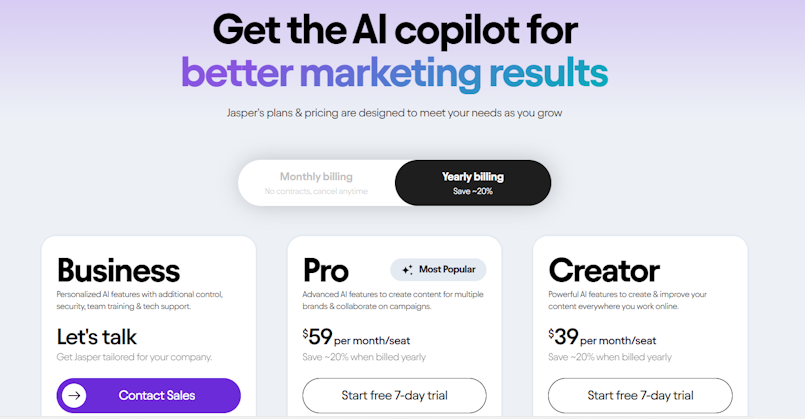
Lexica Art
Visual content is more important than ever in catching the audience's eye, and Lexica Art provides an innovative solution. This tool utilizes AI to generate captivating blog thumbnails, social media posts, and other visual content that stands out. By inputting a simple description, marketers can get unique, engaging visuals that are tailored to their content's theme, significantly reducing the time and effort required for graphic design.
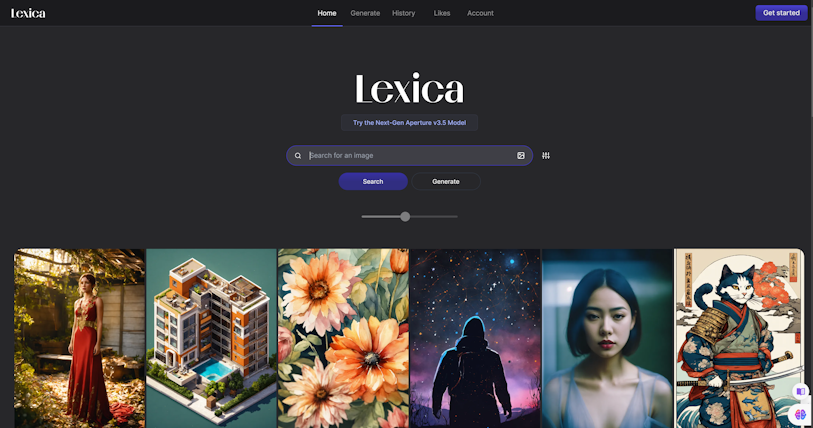
Surfer SEO
In the realm of search engine optimization, Surfer SEO offers a comprehensive platform that leverages AI to analyze and optimize web content for better SERP rankings. It evaluates factors like keyword usage, content structure, and competitor analysis to provide actionable recommendations. This enables marketers to craft SEO-friendly content that is more likely to rank high on search engines, driving organic traffic and enhancing online visibility.
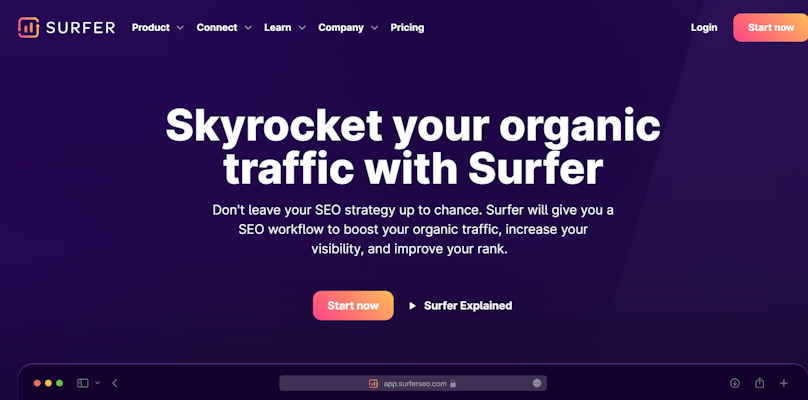
Notion AI
Notion AI significantly empowers marketers by centralizing content management, project tracking, and SEO optimization in one versatile platform. It streamlines the entire content creation process, from brainstorming and drafting to publishing and analyzing performance. By integrating AI capabilities, Notion aids marketers in generating high-quality, SEO-optimized content efficiently, ensuring that marketing strategies are both innovative and aligned with current digital trends. This blend of organizational tools and AI-driven insights offers marketers a comprehensive solution to manage their projects, enhancing productivity and driving better results in their digital marketing efforts.
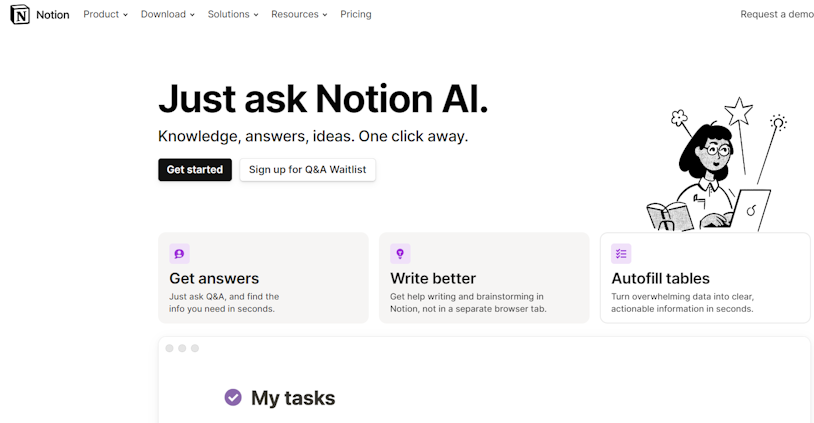
Plannable
Plannable is an intelligent AI marketing tool created to streamline content planning for businesses. Marketing teams can easily collaborate seamlessly, generate ideas quickly, and schedule posts across various social media channels with Plannable.
Plannable's intuitive interface enables users to visually plan out their content calendar, ensuring consistency and strategic alignment with brand objectives. Leveraging AI algorithms, Plannable analyzes audience engagement data to optimize content performance and enhance targeting strategies. Plannable is an all-in-one marketing platform with features designed to assist marketers in efficiently managing campaigns, tracking progress, and producing tangible results. Integrating it into your toolkit could revolutionize content planning workflow while increasing efficiency and increasing ROI.
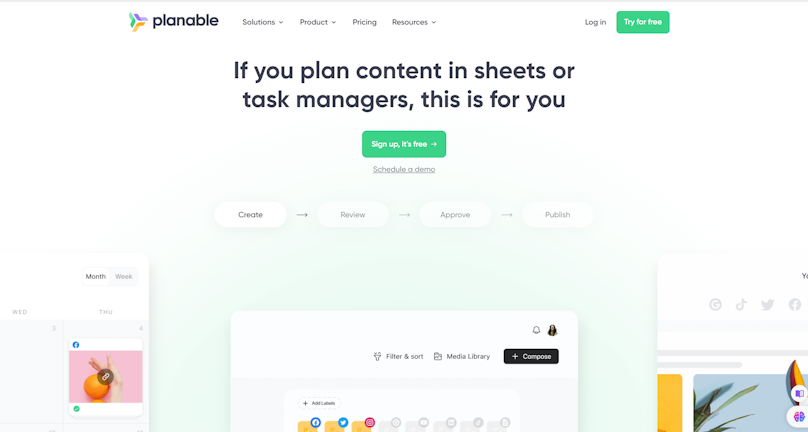
3 Key Benefits of AI Tools for Marketers
The advent of AI tools in the marketing arena has ushered in an era of unprecedented efficiency and personalized customer engagement. These sophisticated technologies are redefining the paradigms of digital marketing, offering a plethora of benefits that are indispensable for marketers aiming to navigate the ever-evolving digital landscape of 2024.
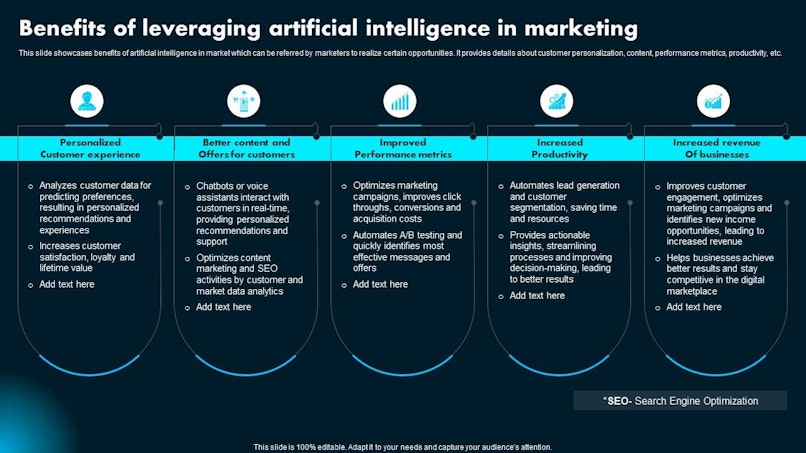
Personalization and Targeting
One of the most significant advantages of AI tools is their ability to facilitate highly personalized marketing campaigns. Unlike traditional marketing strategies that cast a wide net, AI enables the delivery of tailored messages to individual consumers based on their behaviors, preferences, and interaction histories. This level of personalization enhances the customer experience, significantly boosts engagement rates, and drives higher conversion rates. Tools like Jasper AI leverage natural language processing to create content that resonates with specific audience segments, making personalization at a scale not just possible but also efficient.
Efficiency and Automation
AI tools excel in automating repetitive and time-consuming tasks that traditionally require substantial human effort. From scheduling social media posts to optimizing ad spending across platforms, AI can handle a myriad of marketing functions 24/7 without fatigue. This automation extends to content creation and optimization, where tools like Surfer SEO analyze top-performing content and provide actionable recommendations to improve search rankings, thus streamlining the SEO process and freeing marketers to focus on strategy and creative development.
Improved ROI
The adoption of AI in marketing strategies leads to smarter decision-making and more effective campaign management. By analyzing data and identifying trends, AI tools can predict customer behavior and optimize marketing efforts for the best possible outcomes. This data-driven approach minimizes wastage of ineffective strategies and maximizes marketing spend, ultimately leading to a better return on investment.
Moreover, AI's ability to continuously learn and adapt ensures that marketing strategies remain effective over time, keeping pace with changing consumer behaviors and market dynamics. Leverage professional UX-UI Design Services that incorporate AI to create personalized and engaging user experiences, amplifying the benefits of AI in marketing.
To explore the latest AI tools that are shaping the marketing landscape in 2024 and beyond, check out the Top 20+ AI tools list that we've curated for you. By leveraging AI, marketers can not only meet but exceed the expectations of their increasingly sophisticated and demanding audiences, securing a competitive edge in the digital marketplace.
How to Integrate AI into Your Marketing Strategy
This is a multifaceted process that involves aligning technology with your business goals to enhance efficiency, personalization, and decision-making. This endeavour is crucial for marketers aiming to stay competitive in the rapidly evolving digital landscape of 2024. Here's a strategic approach to seamlessly incorporate AI into your marketing workflows:
1. Identify objectives and challenges: Begin by defining what you aim to achieve with AI tools, whether it's improving customer engagement, increasing sales, or streamlining operations. Understanding your marketing challenges helps in selecting the right AI tools that offer solutions tailored to your needs.
2. Select the right AI tools: With many AI marketing tools available, choosing those that align with your objectives is essential. Tools like Jasper AI for content creation, Surfer SEO for optimizing content, and Lexica Art for visuals can enhance various aspects of marketing. Evaluate each tool's capabilities, ease of integration, and potential impact on your strategy.
3. Train Your Team: Successful integration requires your team to be proficient in using these AI tools. Invest in training programs that equip your team with the necessary skills and knowledge to leverage AI effectively. This step ensures that your staff can maximize the benefits of AI in their daily tasks and campaigns.
4. Implement Gradually: Integrate AI tools into your marketing strategy gradually to manage the transition smoothly. Start with one or two tools that address your most pressing needs, and monitor their impact. This phased approach allows for adjustments and learning as you expand AI tool usage.
5. Monitor and Optimize: Continuously monitor the performance of AI tools within your marketing strategy. Use metrics and analytics to gauge their effectiveness in achieving your objectives. Based on these insights, optimize their use, adjusting strategies as needed to ensure optimal results.
6. Stay Updated on AI Advancements: The AI landscape is constantly evolving, with new tools and features being developed regularly. Stay informed about the latest AI trends and technologies to adapt your strategy and leverage cutting-edge tools that can provide a competitive edge.
To stay competitive and effectively integrate AI into marketing strategies, it's crucial to stay informed about the latest advancements. This research publication provides academic insights into AI's impact, highlighting the importance of aligning technology with business goals."
By following these steps, marketers can effectively integrate AI tools into their strategy, enhancing their ability to craft personalized, efficient, and impactful marketing campaigns.
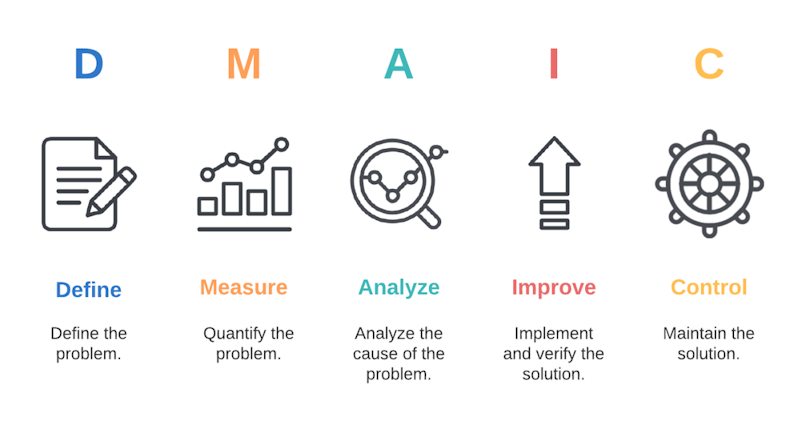
The Future of AI Marketing
AI marketing tools are poised for revolutionary advances that promise to transform the digital marketing landscape. Looking towards the next five years and beyond, several key trends are emerging that offer marketers new opportunities to connect with audiences more effectively and efficiently.
AI's predictive analytics and personalization abilities will reach new heights, creating hyper-personalized marketing strategies. Marketers will utilize AI to anticipate consumer actions based on past behaviors - drastically improving the timing and relevance of messages sent out by marketers.
Voice and Visual Search Optimization
As more people use voice-activated assistants and image search technologies, AI tools will emerge to optimize content for these platforms. As such, new SEO strategies focusing on natural language processing capabilities and visual recognition capabilities must be created so brands remain visible within an increasingly voice-driven world.
AI-Generated Content
Artificial intelligence will become increasingly sophisticated at creating engaging, high-quality, customized content at scale based on the preferences and interests of their target audiences. Marketers will therefore have a greater capacity for creating high-quality, tailored material at scale through AI content generation.
AR and VR
As AR and VR technologies become more accessible, AI will play a critical role in crafting engaging brand experiences for consumers. Marketers will utilize AI-powered solutions to produce personalized AR/VR content that delivers emotional bonds between brands and their target customers.
Ethical AI and Consumer Privacy
As AI becomes a more integrated part of marketing, ethical issues, and consumer data privacy considerations will come to the fore. Marketers will need to strike a balance between AI-powered personalization and respecting privacy, ultimately leading them to design AI tools with ethical standards and transparency.
Automated and Real-Time Decision-making
AI tools will empower marketers to make instantaneous decisions based on real data analysis, increasing agility in marketing campaigns while simultaneously optimizing effectiveness and ROI. This feature can allow for instant adjustments aimed at maximizing effectiveness and return on investment (ROI).
Looking towards the next five years, the predictive analytics and personalization abilities of AI are expected to reach new heights. HubSpot's article on how AI is transforming marketing offers practical examples of AI in action, further emphasizing the revolutionary advances anticipated in AI marketing tools.
These trends point to an AI future in which tools not only automate tasks but also help drive strategic decisions, creating more meaningful consumer interactions. Stay ahead of marketing trends by exploring how AI Startups are revolutionizing the industry with innovative tools and technologies.
FAQs on AI Tools for Marketers
AI tools for marketers are software solutions that use artificial intelligence technologies to automate tasks, generate insights, and enhance marketing strategies. Their uses range from content production and SEO optimization, and customer segmentation analysis to campaign analysis.
How Can AI Tools Aid My Marketing Strategy?
AI tools can strengthen your marketing strategy by providing data-driven insights, automating repetitive tasks, personalizing customer experiences, and optimizing campaign performance in real-time; leading to increased efficiency and ROI.
Are AI marketing tools expensive?
The price of AI marketing tools depends heavily on their features and capabilities, with various providers offering flexible pricing models to fit businesses of various sizes and free trial versions so that customers can test out solutions before committing.
Can Artificial Intelligence Marketing Tools Replace Human Marketers? While AI tools may automate many tasks, their purpose is to complement human marketers by handling data analysis and routine tasks that take up valuable time in creative or strategic work requiring human insight.
How Can I Integrate AI Tools Into My Existing Marketing Stack? Identify areas within your marketing process where AI automation and personalization could add value. After selecting AI tools that integrate seamlessly with existing platforms and workflows, gradually introduce them to your team through training and support programs.
What Is the Future of AI in Marketing? AI will play an increasing role in marketing over time, with greater personalization capabilities, the integration of AI technologies across more marketing channels, ethical use respecting consumer privacy concerns, and technological improvements to further enhance customer experiences and marketing effectiveness.
For those curious about the future of AI in digital marketing and seeking expert opinions, Forbes discusses the future of AI in digital marketing, offering valuable insights into upcoming trends and the potential impact of AI.
Conclusion
As we stand on the brink of 2024, it's clear that AI tools for marketers are not just futuristic concepts but essential instruments in today's digital marketing toolkit. These advanced technologies offer the potential to redefine how brands engage with their audiences, delivering personalized experiences, optimized marketing strategies in real time, and significantly enhancing overall marketing efficiency. By integrating AI into their workflows, marketers can unlock new insights, creativity, and productivity, ensuring their brands remain competitive in an ever-evolving digital landscape.
The journey ahead promises even more innovative AI applications in marketing, from predictive analytics to augmented reality experiences. As marketers, embracing these tools will be key to navigating the complexities of digital marketing, allowing for more meaningful connections with consumers and driving forward the boundaries of what's possible. The future of marketing is intelligent, adaptive, and exciting, with AI at its core. Now is the time to explore, adopt, and leverage AI marketing tools to not just keep pace with change but to lead the charge into the future of digital marketing.



